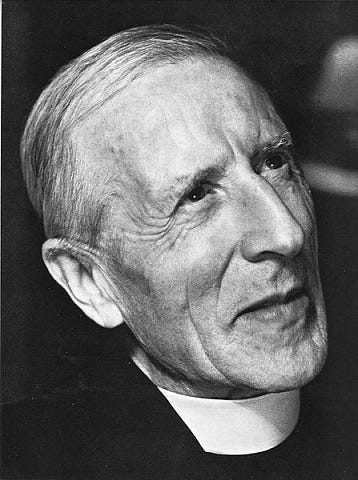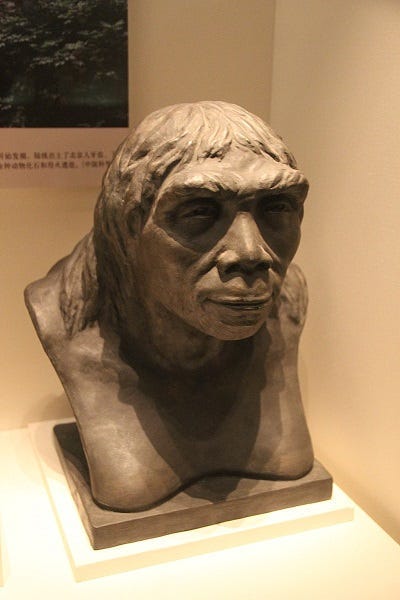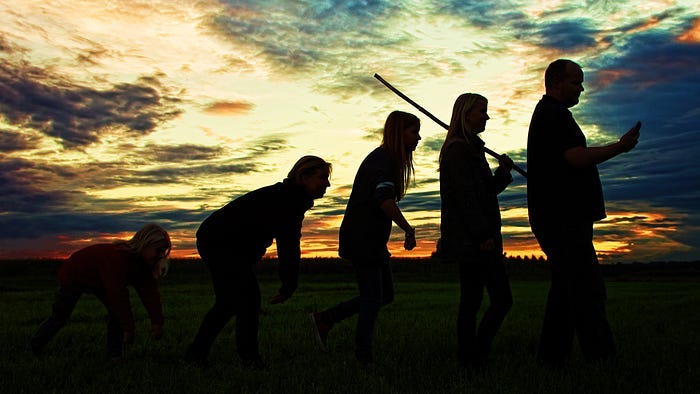This Priest Saw God In Evolution
Pierre Teilhard de Chardin and his theory of evolving human consciousness

“Someday, after mastering the winds, the waves, the tides and gravity, we shall harness for God the energies of love, and then, for a second time in the history of the world, man will have discovered fire.”
We tend to look at evolution as something that’s happened in the past. Even saying the word brings to mind scientists digging up bones. For instance, this long-dead creature “A” molded itself over time and trial to animal “B,” which we’re more familiar with today. Obviously, I oversimplified the infinitely complex and skipped a lot.
Although, it’s not far from the truth. Evolution makes people think of fossils and maybe the Galapagos Islands — things that have already occurred. But an interesting character had very different ideas about it. Namely, it’s not done.
Father Pierre Teilhard de Chardin also believed that evolution wasn’t limited to material things.
More than bones, cells, and living creatures evolve. Consciousness does as well. In one of the stranger combinations in history, he blended a mixture of science, religion, and archeological research with our human ancestors into a mixed theory of evolution sprinkled with Christian concepts.
One of his main thoughts was that evolution continues with the human mind and its power of thought, evolving into something greater than could ever be imagined.
Initially, he managed to unite the religious and scientific community in a way he hadn’t anticipated. Both panned him relentlessly. His Jesuit order wouldn’t allow his books to be released until after his death, and scientific reviewers called his ideas ridiculous.
However, he’s spurred renewed interest in recent times. While his ideas may be truly unique, so was the man himself.
Teilhard became a highly decorated soldier that never carried a gun.
He worked at breakthrough archeological digs, finding ancient precursors to modern man
While science and religion battled about the existence of evolution, Teilhard proclaimed to see God in the science
The priest had an optimistic view of mankind’s future, turning evolution into a philosophy and mixing it with his religious beliefs
In fact, before you can truly understand his theory, you need to understand Father Pierre Teilhard de Chardin’s life. So, let’s begin there.
Teilhard’s Wide Ranging Life
According to the Encyclopedia Britannica, the future priest was born in France to a family of farmers. Geology caught his attention early. As he aged, he studied it in depth at the Jesuit College of Mongré. By eighteen, he started the process to enter the Jesuit order, eventually teaching at their school in Cairo for a few years.
He was fully ordained a priest shortly before WWI and drafted.
Loyola Press’ Ignation Spirituality (IS) website says Teilhard declined a commission to be a chaplain and served as a stretcher bearer at the frontlines. So, he saw Champaign, Verdun, and the second Battle of the Marne personally. It shook his faith at points.
And why wouldn’t it? The stretcher bearer’s nation suffered over six million casualties, which was about seventy percent of their entire army. Teilhard won both the Croix the Guerre and the Chevalier de la Legion d’Honneur for his bravery.
He completed his doctorate in geology after the war. In 1923, he was sent to China. A few years later, he was involved in a dig that discovered the Peking Man’s skull — an ancestor to modern humans. He’d spend over twenty years moving through China, the Gobi (desert), Sinkiang, Kashmir, Java, and Burma cataloging fossils.

He experienced primitive conditions, civil war, cold, heat, and the Japanese invasion in WWII. However, he still managed to write five books. Most of which his Jesuit order didn’t allow him to publish due to mixing evolution with theology.
The order also didn’t allow him to teach in France after his research abroad was complete. He eventually moved to the United States, spending the rest of his short life in New York.
His two famous works The Divine Milieu and The Phenomenon of Man were published in the later 1950s, after his death. Now, I’m sure you’re wondering what disturbed the Church so much? Well, such a unique life would guarantee an equally unique philosophy that didn’t fit a religious order’s neat mold.
Teilhard’s Religious Philosophy Of Evolution
“We may, perhaps, imagine that Creation was finished long ago. But that would be quite wrong. It continues in still more magnificent form in the highest zones of the world….Our role is to help complete it, if only by the humble work of our hands. This is the real meaning and the price of our acts. Owing to the interrelation between matter, soul, and Christ, we lead part of the being which he desires back to God in whatever we do.”
In The Phenomenon of Man, Teilhard explains from the start of the universe, complexity increases. Think about it. Everything started with the simplest molecules, forming atoms, and eventually creating base elements.
Hydrogen and Helium later gave rise to most of the wide array of squares we see in the periodic table of elements. He refers to this as the Law of Increasing Complexity. Similarly, life works much the same way.
One-cell organisms grew in complexity, eventually becoming life in advanced forms we recognize today.
But there was a major development — consciousness. A branch of primates came to “know that they know.” This greater thought potential allowed them to develop language, technology, culture, and finally populate the planet.
But this consciousness isn’t done evolving, becoming more complex like everything else. Mankind will eventually link in a network. Teilhard referred to this as the noosphere, which originates from the Greek meaning “sphere of reason.”
Just as the Earth developed a barysphere, lithosphere, hydrosphere, atmosphere, and biosphere, consciousness will create its own change to the planet. But this will be a “social phenomenon.” Religion, technology, education, legal systems, and research being its drivers.
It’ll eventually culminate to an Omega Point. This is where consciousness reaches an apex, and all humanity firmly links together without the common barriers which divide us. Teilhard believed this achievement would bring about Christ’s return. Afterwards, we’d be freed from our material bonds.
As you can imagine, the Vatican wasn’t thrilled, and neither was the scientific community.
Teilhard’s Ideas Today And Message For Us

The Office of the Vatican issued a monitum, or warning against Teilhard’s writings in 1962. British Nobel Prize winner Peter Medawar, called his ideas “nonsense” in 1961 and accused him of deceiving himself and the public. Later, Richard Dawkins declared Teilhard’s work “bad poetic science.”
Yet, it only delayed his message.
In 2009, Pope Benedict praised Teilhard’s idea of the cosmos as a living host
A 1995 Wired Magazine article proclaimed Teilhard “set down the philosophical framework for planetary, Net-based consciousness 50 years ago”
David Sloan Wilson, an evolutionary biologist and co-founder of the Evolution Institute, called Teilhard’s ideas “scientifically prophetic,” in his 2019 book This View of Life: Completing the Darwinian Revolution
A panel of PhDs gathered to discuss the priest’s life and works in 2015, putting things in perspective. Some of the members personally knew Teilhard. They explained he was an eternal optimist and evolution made him so.
Why? Well, evolution by nature is a slow process.
It contains branches with many dead ends but always continues forward over time. So, we need patience. Likewise, his book The Phenomenon of Man was written in the 1930s, released in the 1950s, and was only appreciated about seventy years later after it was initially penned.
Teilhard saw the worst depravities of man, in both WWI and WWII. He’d been denounced by his own religious order. Even the science community mocked him. In a way, it’s apropos a war hero carrying no weapon could handle incoming fire with such grace.
His unique life allowed him to see science, humanity, and spirituality.
Science in evolution proved things progressed and became more complex
Humanity showed him both destruction and wonder
Spirituality rounded the group demonstrating mankind’s journey as “nothing so much as a way of the Cross.”
Teilhard’s message is one we need in a world populated by those preaching it’s the end of humanity. Evolution isn’t complete. Our consciousness is destined to continue its arc of complexity. But expect dead ends and frustration.
Although with research, spirituality, and the “humble work of our hands,” humanity will discover fire for a second time in its history.



Consciousness has always been evolving and will keep doing so. Thats why dogmas have so much trouble. One of the poets said, referring to "God" as the only constant in a world of change. It might have been Coleridge.